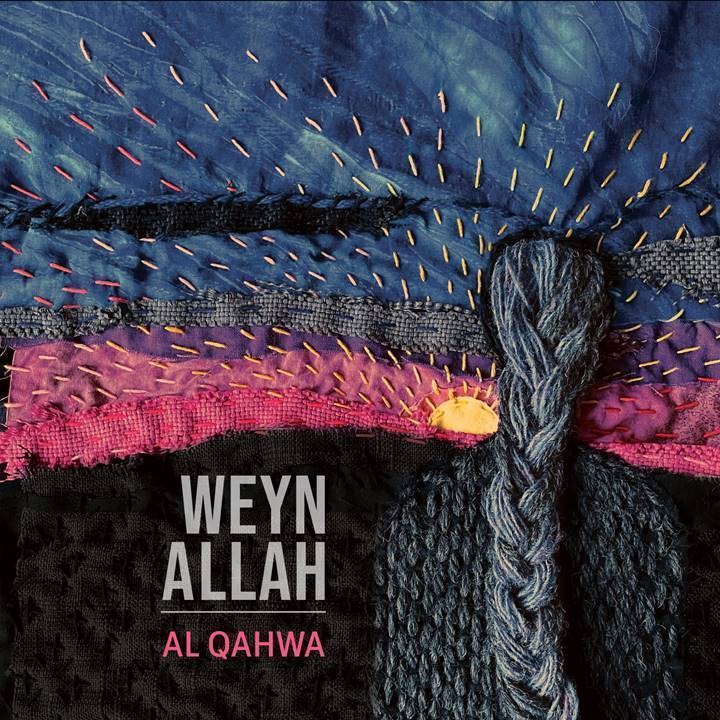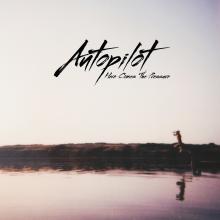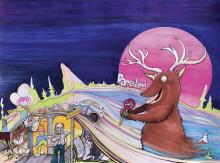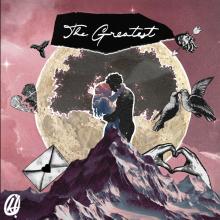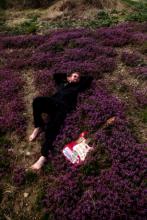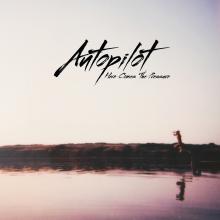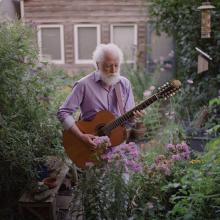World music group AL QAHWA ENSEMBLE will release their fourth album WEYN ALLAH (Where is God?) officially on June 1stand will celebrate the release with a live concert at Toronto’s Tranzac Club on Sunday, June 18, 2023 from 7:00 pm to 10:00 pm. The ensemble, from varied backgrounds are Egyptian-Canadian Maryem Tollar on vocals, riqq (Arabic tambourine) and qanun (Arabic table harp); Irish/Acadian/Hungarian-Canadian Ernie Tollar on wind instruments; Greek-Canadian Demetri Petsalakis on oud (Arabic fretless lute); and Iranian-Canadian Naghmeh Fahrahmand on Middle Eastern percussion. Special guests include Sudanese-Canadian Waleed Abdulhamid on bass, percussion, and vocals; Jamaican-Canadian Lauren Barnett on backup vocals and saxophone; andPalestinian-Canadian Roula Said will join the group on backup vocals, percussion and dance for the live event only. The concert will also showcase Petsalakis’ electronic dance duo Catchfiyah, with wifeBarnett, who’ll do a short set of music after Al Qahwa’s set. Weyn Allah is available on all platforms where music is streamed or downloaded.
Since their breakout album The Coffee House in 2016 – the group name Al Qahwa is Arabic for “the coffee house,” and was inspired by the coffee house culture in the Middle East, where people would go to hear the latest news, music, poetry and stories – Al Qahwa Ensemble has performed original compositions, instrumental improvisations, as well as popular traditional Arabic repertoire. Their music ranges from hypnotic Sufi Devotional Love songs from the Arab world, to popular folk songs, to classic Egyptian songs. Following their highly acclaimed sophomore album Cairo Moon, and third album African Routes, the ensemble continues to breathe new life into traditional Arabic songs alongside innovative originals.
The title track, “Weyn Allah,” written by Maryem Tollar, is simultaneously an acknowledgement of the imposed isolation of the past few years, a prayer to recognize the Godly qualities in ourselves, and a statement of activist purpose in pursuing justice for the oppressed, as it builds slowly in layers from a quivering oud and primal beat to full, rich instrumentation, and a beautiful mass of harmonizing voices. The English translation of “Weyn Allah” is “Where is God?”
“Share The Beauty,” a collaboration between the band’s oud player Demetri Petsalakis (music) and singer Maryem Tollar (lyrics), sounds very traditionally Greek, but Demetri invited Maryem to add lyrics to it, which she did in Arabic. The instruments are a full bouzouki ensemble (all played by Demetri) – the tzoura, bouzouki, baglama, and oud. Maryem’s lyrics, about rising to share your light and beauty in a changing world, were inspired by her experiencing that first-hand, as her collaborators and activists around the world have done, to help us cope with the many crises at our doorsteps.
“Humanity (Bora),” written by the band’s bassist Waleed Abdulhamid, is a bright, fast-paced romp propelled by his many layers of percussion, and featuring both the group’s choral harmonies, and catchy horn parts. The entire English translation of the lyric, sung in Kiswahili (a dialect of Swahili in Tanzania), is, “Best / We believe in the best / We believe in the goodness of people / Humanity.”
“Spencer's Kitchen,” an instrumental written by the band’s wind instrumentalist Ernie Tollar, was inspired by Celtic musician Spencer Murray, but also has South Indian rhythmic influences. Ernie’s yearning flute is simply gorgeous, as it weaves along its wandering journey throughout this short, sweet, and lilting piece.
“The Sky Is Falling,” initially written by Maryem, arrived when the lyrics came on one of her many pandemic walks during the summer of 2020, as a diverse mix of people flocked to the parks of Toronto to hang out. Despite much uncertainty, the many scenes of community, impromptu outdoor cafés, beautiful weather, and so on, made it all seem positive. Maryem asked Dominique Denis to add some French lyrics, with the same intention. “The Sky Is Falling” features some inspired whistling – in imitation of the recorded birds that open the song – as well as a lovely, folkish vocal from Maryem; some utterly captivating harmonies in response, especially toward the end; people imitating barking dogs; and a sax solo from Ernie Tollar that begins wildly, then perfectly captures the bittersweet mood of the song.
“Heaven's Nay” is an instrumental featuring the Arabic nay flute, written by Ernie. It’s a minute-long refresher, where he’s wailing like the Dickens, with a one-chord vibrato ganon hanging back behind him.
Maryem wrote “Fly My Love (Tiri Ya Habibti)” shortly after her mother passed away in 2020. With a lyric dedicated to her, the song started with an Arabic rhythm in 10/4, and an ostinato on the qanun. Trance-like and meditative, it soars on the wings of a haunting minor-key melody, Ernie’s droning saxophone, and – once again – those impeccable vocal harmonies.
“Little Moments” is an instrumental by Demetri, featuring the many stringed instruments that he enjoys playing, with percussion from Waleed. Another short refresher, it sounds like something renowned guitarist Leo Kottke might have written if he leaned in an Eastern, rather than Western, direction.
“Duniya Farewell,” a collaboration between Ernie (music) and Maryem (lyrics), is the result of some conversations between them, contemplating what our purpose is in the world, and what a gift our existence is. Ernie says that when he was writing the song, he thought, “All is temporary, but also endlessly novel, therefore all moments – before, during, and after life – are a gift worth living and loving fully.” The lyric is delivered, first in English, as a solo spoken word of love over a moody melody; then sung, in Arabic translation, with percussion, as a slow and solemn prayer; then sung in English, with harmony, as a celebration of life.
“Daff Heart” is an improvisation on the Persian daff hand drum by the band’s percussionist Naghmeh Farahmand – another short palate cleanser, this time highlighting the penetrating, percolating skills that she brings to Al Qahwa.
Maryem created “Rhythm Of Our Hearts (Ta'alu NiTabbil)” when Ritesh Das, of the Toronto Tabla Ensemble, asked her to write a song to perform with his group. She wanted to do something that could feature the drum, and enjoyed it so much she brought it to her own group to see what they might add to it. Ernie came up with a beautiful modulation, where he did a sax improvisation in a Pentatonic scale that shifts the song into a stunning, dreamlike trance for a moment, before it moves to a vocal-rich buildup and climax.
Highlighted by bubbling percussion and the dulcet tones of the kalimba (African thumb piano), Waleed’s song “Hard Life (Maisha Magumu),” again sung in Kiswahili, offers another minute-long booster to quickly captivate. This time, the entire English translation of the lyric is, “Life is very hard / Very very hard / Let’s find a way to make life easy / To make life easy, easy / Respect.”
“Peace and Safety (Salma Ya Salama)” is a song made famous by a French diva, Dalida, who was beloved in Egypt; in fact, every time Maryem made a trip to her ancestral homeland of Egypt, she’d always see Dalida on TV. So Maryem adapted her own version of the Dalida-covered song from the original, traditional Egyptian version – composed by the beloved Sayyid Darwish, with lyrics by Salah Jahin. The song’s message is that we’ve travelled and left our homeland, but returned safely. Sung in both French and Arabic, it’s a sweet, pop-flavoured song that’s light on its feet.
“Forget Our Worries (Hayyas)” came to Maryem in a dream, where people were dancing, having fun, and – just for a night – not worrying about any problems at all, whether their own, or those in the wider world. Sung in Arabic, its universal, life-affirming spirit of love would come through in any language. The laughter in the song is real, and hopes to inspire the same in the listener.
Album Release Concert Celebration:
SUNDAY, JUNE 18, 2023
@The Tranzac Club, 292 Brunswick Avenue, Toronto
7:00-10:00 PM | $15 TICKETS
alqahwa.ca



